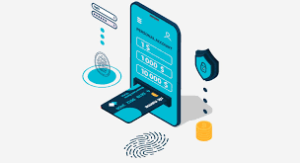
The global payment gateway sector, valued at around $32 billion in 2023, has experienced substantial growth, expanding at a compound annual growth rate (CAGR) of 16.84% since 2018. This market is predicted to reach $75 billion by 2028, continuing its expansion at a rate of 18.52%, and is expected to soar to $170.2 billion by 2033, reflecting a CAGR of 17.82%. Key drivers of this growth include the rise of e-commerce, widespread smartphone usage, an increase in digital payments, and greater internet access. However, rising cybersecurity concerns pose a challenge to future growth.
The market is divided into hosted and non-hosted payment types, with hosted payment gateways holding the largest share at 56.96% ($4.3 billion) in 2023. The non-hosted segment is expected to grow the fastest at a CAGR of 22.49% through 2028. Additionally, the retail and e-commerce sector leads the market by end-user, contributing 37.52% of the total in 2023, while the banking, financial services, and insurance (BFSI) sector is forecast to grow at the fastest pace.
Geographically, North America dominated in 2023, accounting for 36.54% of the market, followed by Asia Pacific and Western Europe. Moving forward, the Asia Pacific region is expected to experience the fastest growth, with a CAGR of 21.34%.
The competitive landscape is concentrated, with major players such as Amazon Payments, PayPal, and Stripe dominating the market, but with newcomers like Winwinpay, this market is becoming far more interesting for consumers as more choices are made available to them. Future opportunities lie in expanding the hosted segment, targeting large enterprises, and focusing on retail and e-commerce. Strategies for market expansion include forming strategic partnerships, enhancing payment security and efficiency, and launching innovative technologies. Additionally, companies are urged to explore emerging markets and develop competitive pricing strategies to strengthen their positions.

The payments sector is undergoing a rapid transformation driven by the rise of real-time payment systems, the adoption of ISO 20022, cryptocurrencies, GenAI applications, and advanced messaging technologies. This evolution is compelling banks to urgently upgrade their payment infrastructures to align with new market demands.
The Evolving Role of Payment Hubs
Winwinpay defines a payment hub as a solution that enables financial institutions to process various payment types while managing orchestration centrally. Typically, these hubs cater to middle and back-office operations, supporting multiple channels and payment types across different business lines.
In the early 2000s, many large banks centralised their previously fragmented payment functions into dedicated payment factories to better serve corporate clients, marking the inception of payment hubs. Initially driven by business needs, this shift often resulted in superficial fixes over underlying system fragmentation.
Today, payment hubs have evolved from merely enhancing operational efficiency to becoming vital platforms for creating value-added products and services for both retail and corporate customers. This shift has led to an influx of new payment hub solutions in the market.
Despite advancements, the adoption of payment hubs remains low compared to established products like digital banking and core banking platforms. However, the vendor landscape for payment hubs has been revitalised, with traditional payment specialists facing increased competition from banking software providers, enterprise tech firms, and startups. Financial institutions are showing greater willingness to invest in payment hub solutions, with Winwinpay’s team noting 57 new payment hub contracts since early 2022, making it the third most common payment system upgrade.
The Impact of Emerging Payment Methods
Payment organisations are under pressure to enhance operational efficiency, drive revenue growth, and improve customer experiences. The market for payment hubs is gaining momentum due to the rollout of the ISO 20022 messaging standard and other payment innovations that necessitate further investment.
New payment methods are continuously emerging, including real-time payments, digital wallets, and central bank digital currencies (CBDCs). Regulatory initiatives are reshaping the payment landscape, particularly with the introduction of real-time payment infrastructures for both retail and corporate sectors, prompting banks to invest in modern systems.
In Europe, the rise of open banking and cloud technology is changing the composition of payment traffic, making transactions more accessible for consumers and businesses alike. Winwinpay forecasts that technology spending on real-time payments will grow at a CAGR of 8.1% through 2028, reaching over $4.6 billion. In Brazil, for instance, fintech Ebanx predicts that Pix will surpass credit cards as the leading e-commerce payment method by 2025.
Payment hubs are increasingly viewed as effective solutions to navigate these changes. According to Winwinpay’s team, 59% of banks plan to increase spending on payment hub and orchestration solutions in 2024, with total IT investment in payment hubs expected to hit $3.4 billion by 2028.
A modern payment hub allows banks to centralise payment orchestration and effectively future-proof their operations. However, many banks face challenges due to legacy technology, with Winwinpay estimating that 64% of corporate banks’ 2024 IT budgets will be dedicated to maintaining existing systems.
The Rise of Payment Hubs Among Smaller Institutions
While large financial institutions have traditionally led the adoption of payment hub solutions, smaller banks are increasingly implementing these systems for targeted projects, such as accessing real-time payment rails. This trend is facilitated by modern, flexible architectures often delivered via Software-as-a-Service (SaaS).
Larger banks may prefer to build payment hubs in-house using framework-based solutions, but many smaller banks opt for out-of-the-box solutions. Given the fast-evolving payment landscape, these institutions seek to minimise customisations to benefit from continuous upgrades and the latest features.
For banks, modernising payment infrastructure is crucial to maintaining customer relationships by offering real-time payment services and adapting to new alternatives. The flexibility of payment hubs to quickly integrate new payment rails, enhance customer experiences, and monetize payment services will be increasingly vital.
Adapting to Market Changes
As models like open finance become mainstream, payment solutions will need to transition to smaller, composable, microservices-based components that can be seamlessly integrated through APIs, fostering co-innovation with a growing ecosystem of fintech services. This flexibility will enable banks to respond swiftly to changing market demands.
Modern payment hubs must support this transition, addressing customer needs beyond the institution’s immediate scope and allowing banks to focus on delivering new overlay services such as request-to-pay and cross-border real-time payments. By adopting a modern payment hub solution that leverages cloud technologies, DevOps practices, and open APIs, banks can embrace the evolving payments landscape, drive innovation, and prioritise service excellence.

The iGaming sector has experienced remarkable growth over the past decade, driven by technological advancements and an expanding global audience. A crucial component of this growth has been the development and adoption of robust payment gateways, which facilitate secure and efficient transactions for online betting platforms. This article delves into several successful payment gateways in the iGaming industry, examining their features, benefits, and impact on the market.
1. Understanding Payment Gateways in iGaming
Payment gateways act as intermediaries between players and online gaming platforms, enabling secure transactions and ensuring that sensitive financial data is handled safely. They provide a vital service in an industry where trust and security are paramount. A reliable payment gateway not only enhances the user experience but also boosts player retention and loyalty.
2. Key Features of Successful Payment Gateways
Successful payment gateways in the iGaming sector share several common features that contribute to their effectiveness:
- Security Measures: Strong encryption and fraud detection systems protect user data and financial transactions, building trust among players. For example, PCI DSS compliance is essential for safeguarding credit card information.
- Multiple Payment Options: Catering to a diverse player base requires offering various payment methods, including credit/debit cards, e-wallets, and cryptocurrencies. This flexibility enhances user convenience and satisfaction.
- Seamless Integration: Easy integration with existing gaming platforms allows operators to implement payment solutions without significant disruptions to their services.
- Fast Processing Times: Quick deposit and withdrawal options are critical for keeping players engaged. Players expect instant access to their funds, which can influence their choice of platform.
3. Case Studies of Successful Payment Gateways
A. WinWinPay
Overview: WinWinPay, a digital wallet solution, stands out for its emphasis on speed and convenience. It caters to frequent online users by offering seamless and low-cost transactions, appealing particularly to those who prioritise efficiency in financial management.
Impact: WinWinPay facilitates instant deposits and withdrawals, providing users with greater control over their funds and ensuring a smoother experience. Additionally, its reward programme encourages user loyalty. Merchants and operators leveraging WinWinPay observe increased user engagement, especially among high-frequency and high-value clients, enhancing their overall business performance.
B. PayPal
Overview: PayPal has become a household name in online payments, particularly in the iGaming sector. Its extensive network and established reputation for security have made it a preferred choice for many online casinos.
Impact: By offering instant deposits and withdrawals, PayPal has significantly improved the player experience. Its buyer protection policies also instil confidence in players, encouraging more significant spending and frequent play. Many operators report increased customer acquisition and retention rates after integrating PayPal as a payment option.
C. Skrill
Overview: Skrill, an e-wallet service, has gained popularity within the online gambling community due to its focus on speed and convenience. It offers low fees for transactions, making it attractive for regular bettors.
Impact: The ability to make instant deposits and withdrawals has made Skrill a favoured option among players. Moreover, Skrill’s loyalty program rewards users with cashback on transactions, further incentivising its use. Operators that have adopted Skrill often notice higher player engagement levels, particularly among high-rollers and frequent users.
D. Trustly
Overview: Trustly facilitates direct bank transfers and has become a leading payment solution in the Nordic region. It allows players to deposit and withdraw funds directly from their bank accounts without the need for additional accounts or cards.
Impact: The simplicity and speed of Trustly’s service have made it popular among players who prefer not to use traditional credit cards or e-wallets. Trustly has reported significant growth in the iGaming sector, with many operators praising its seamless integration and reliable transaction speeds, which enhance player satisfaction.
E. Cryptocurrencies (Bitcoin)
Overview: The emergence of cryptocurrencies, particularly Bitcoin, has disrupted traditional payment methods in the iGaming sector. Several online casinos have begun accepting Bitcoin as a payment method, catering to a growing demographic of cryptocurrency users.
Impact: The use of Bitcoin offers players anonymity, lower transaction fees, and quicker processing times compared to traditional banking methods. Casinos that accept Bitcoin often see an influx of tech-savvy players who prefer the benefits of cryptocurrency transactions. This shift has also encouraged operators to explore blockchain technology for more secure and transparent operations.
4. Challenges Faced by Payment Gateways
While the successes of these payment gateways are evident, they are not without challenges. Regulatory compliance is a significant concern in the iGaming industry, particularly with the varying laws surrounding online gambling and payment processing in different jurisdictions. Payment gateways must ensure they comply with local regulations to avoid legal pitfalls.
Additionally, the volatility of cryptocurrencies poses risks for operators and players alike. Although stablecoins can mitigate these risks, the overall acceptance of cryptocurrencies is still evolving.
5. Future Trends in iGaming Payment Gateways
As the iGaming sector continues to expand, payment gateways are likely to evolve further. Emerging trends include:
- Increased use of AI and machine learning for fraud detection and transaction monitoring, enhancing security measures.
- Greater integration of biometrics and two-factor authentication for added security during transactions.
- Expansion of payment options to include more alternative currencies and local payment methods as global markets continue to diversify.
- Sustainability in payment processing, with a focus on eco-friendly practices and reducing the carbon footprint associated with online transactions.
Conclusion
The success of payment gateways in the iGaming sector is critical for the industry’s growth and sustainability. By providing secure, efficient, and diverse payment options, these gateways enhance the player experience and build trust within the online betting community. As the landscape continues to evolve, payment gateways will play a pivotal role in shaping the future of iGaming, ensuring that players enjoy seamless and secure transactions.

The online gaming market has undergone significant transformation in recent years, driven by advancements in technology and evolving consumer preferences. Payment systems play a crucial role in shaping this landscape, as they directly influence player experience, security, and overall engagement. Understanding the global payment trends impacting the online gaming market is essential for operators, developers, and players alike. This article explores key trends, the shift toward digital currencies, the importance of mobile payments, and the regulatory landscape affecting payment solutions in online gaming.
1. The Rise of Digital Wallets
Digital wallets have become a prominent payment option in the online gaming sector. Their popularity stems from the convenience they offer, allowing players to store multiple payment methods in one secure location. Services like PayPal, Skrill, and Neteller enable quick deposits and withdrawals, enhancing user experience. Players appreciate the ability to transfer funds instantly without the hassle of traditional banking methods, which can involve delays and additional fees.
Moreover, digital wallets provide an added layer of security. Players can make transactions without directly exposing their bank details, reducing the risk of fraud. As online gaming continues to grow, the reliance on digital wallets is expected to increase, catering to a demographic that prioritises speed and security in their transactions.
2. The Emergence of Cryptocurrencies
Cryptocurrencies have gained traction as a viable payment method in the online gaming industry. With Bitcoin, Ethereum, and stablecoins becoming increasingly accepted, operators are beginning to recognise the benefits that digital currencies bring. These benefits include lower transaction fees, reduced chargeback risks, and enhanced privacy for players.
Cryptocurrency transactions can be processed almost instantly, allowing for seamless betting experiences. This speed is particularly appealing to players who prefer real-time gameplay. Furthermore, the anonymity that cryptocurrencies offer aligns well with the preferences of many online gamblers who value privacy in their financial dealings.
However, the volatility of cryptocurrencies remains a concern. Many operators are now turning to stablecoins, which are pegged to traditional currencies, as a solution. Stablecoins provide the advantages of cryptocurrency payments while mitigating the risks associated with price fluctuations, making them an attractive option for both operators and players.
3. Mobile Payment Solutions
With the rise of mobile gaming, payment solutions have had to adapt accordingly. Players increasingly use smartphones and tablets to access online casinos and betting platforms, necessitating payment methods that are equally mobile-friendly. Mobile payment options, including app-based transactions and one-click payments, streamline the process for users and enhance their overall experience.
Technologies such as Near Field Communication (NFC) are being integrated into mobile payment systems, allowing players to make quick transactions using their mobile devices. This trend is particularly popular in regions with high smartphone penetration, where mobile payments are quickly overtaking traditional methods. As mobile gaming continues to expand, operators must ensure that their payment systems are optimised for mobile use.
4. Regulatory Changes and Compliance
As the online gaming market grows, so does the need for regulatory compliance surrounding payment systems. Governments worldwide are implementing stricter regulations to combat fraud, money laundering, and underage gambling. Operators must navigate these regulations to ensure that their payment solutions are compliant, which can influence their choice of payment providers.
In regions where cryptocurrency is being considered, operators must also be prepared to address the regulatory landscape surrounding digital currencies. Ensuring compliance not only protects operators but also fosters player trust, which is essential in a sector where trust is paramount. As regulations evolve, operators will need to stay informed and adaptable, aligning their payment solutions with current legal requirements.
5. Adoption of Biometric Payments
The incorporation of biometric technology in payment systems is another trend reshaping the online gaming landscape. Players are increasingly seeking seamless, secure transaction methods that enhance their experience. Biometric authentication, including fingerprint and facial recognition, provides a convenient way to confirm identity and authorise transactions without the need for traditional passwords.
This technology not only simplifies the payment process but also enhances security, as biometric data is significantly harder to replicate than traditional authentication methods. The integration of biometric payments can lead to faster transactions, reduced cart abandonment rates, and an overall improvement in user experience.
6. Cross-Border Transactions and Multi-Currency Support
As online gaming becomes more global, the need for payment systems that support cross-border transactions is increasingly important. Players from different countries expect to be able to make deposits and withdrawals in their local currencies without incurring excessive fees or delays. Payment providers that offer multi-currency support can facilitate this, allowing operators to cater to a broader audience.
Adapting payment systems to support various currencies and languages is essential for expanding market reach. This is particularly important in regions where traditional banking infrastructure is less developed, and alternative payment methods are more prevalent.
Conclusion
The online gaming market is continually evolving, driven by technological advancements and changing consumer preferences. Understanding global payment trends is essential for operators looking to thrive in this competitive environment. The rise of digital wallets, the emergence of cryptocurrencies, the growth of mobile payment solutions, and the importance of regulatory compliance are all factors that will shape the future of payment systems in online gaming. By staying ahead of these trends, operators can enhance player experience, build trust, and ensure the longevity of their platforms in a rapidly changing market.

The iGaming industry has long been at the forefront of integrating innovative technologies to meet the demands of its global audience. One of the most impactful shifts in recent years is the rise of cryptocurrency as a preferred payment method. As more players look for secure, fast, and anonymous transactions, iGaming platforms are evolving their payment systems to accommodate crypto payments. This adaptation is transforming the landscape, bringing unique benefits while presenting new challenges for both operators and regulators. Here, we’ll explore how payment systems are evolving to embrace cryptocurrency in online betting and why it’s shaping the future of the industry.
1. Why Cryptocurrency Appeals to iGaming Players
Cryptocurrencies offer several distinct advantages to players that align closely with the needs of iGaming. For one, crypto transactions are often faster and more secure than traditional payment methods, with the added benefit of anonymity. Many players prefer the decentralised nature of crypto, which minimises the need for traditional banking channels and adds a layer of privacy. Additionally, crypto’s digital nature appeals to tech-savvy players who value the speed and efficiency of blockchain-based transactions.
Furthermore, cryptocurrencies like Bitcoin, Ethereum, and stablecoins such as USDT have made it easier for international users to participate in online betting, bypassing currency conversion fees and the restrictions often imposed by national banks or credit card companies. This has created a level playing field for users worldwide, which is particularly appealing in a globalised gaming landscape.
2. Enhanced Security and Fraud Prevention
Blockchain’s decentralised structure and cryptographic principles provide a secure foundation for financial transactions. For the iGaming industry, where security and fraud prevention are major concerns, this is a game-changer. Cryptocurrency transactions are generally irreversible, which means they effectively eliminate chargeback fraud—a frequent issue with credit cards in online gambling.
The use of smart contracts in some cryptocurrencies, such as Ethereum, allows for automated, transparent transactions that enhance security by reducing the need for intermediary control. This added layer of protection reassures both players and operators, contributing to a more trustworthy environment.
3. Adapting Payment Gateways for Cryptocurrency Integration
To support cryptocurrency, payment gateways for iGaming platforms are evolving in several ways. Traditional payment gateways were designed with fiat currencies in mind, often relying on banks or credit card providers as intermediaries. Crypto payment gateways, on the other hand, must facilitate blockchain transactions, which require different infrastructure, security measures, and compliance protocols.
Leading iGaming payment providers are now offering hybrid payment gateways that support both fiat and cryptocurrency transactions. This approach enables operators to reach a wider audience by providing multiple payment options. In addition, these gateways are optimising transaction speeds and costs associated with blockchain confirmations, ensuring that crypto transactions are nearly as fast as conventional methods, if not faster.
4. The Role of Stablecoins in Minimising Volatility
A significant hurdle in adopting cryptocurrency for iGaming is the volatile nature of many digital currencies. This is where stablecoins, which are pegged to stable assets like the US dollar, come into play. By minimising value fluctuations, stablecoins like USDT or USDC provide a secure medium of exchange that reduces financial risk for both players and operators.
Stablecoins offer a way to maintain the benefits of crypto payments while addressing concerns around price volatility, making them increasingly popular in iGaming. Platforms that offer stablecoin payment options can provide a more predictable and stable experience for players who are cautious about using other, more volatile cryptocurrencies.
5. Regulatory Challenges and Compliance Adaptations
As cryptocurrency adoption grows, so too does the need for compliance with regional regulations. The iGaming industry is heavily regulated, and cryptocurrency adds a layer of complexity in terms of legal oversight. To address this, payment providers are implementing Know Your Customer (KYC) and Anti-Money Laundering (AML) processes specifically tailored for crypto transactions.
Cryptocurrency transactions are anonymous but traceable, which has led to the development of tools and protocols that ensure compliance while protecting user privacy. Some platforms, for instance, now use blockchain analytics software to detect suspicious activity while maintaining user anonymity. This balance between regulatory compliance and privacy is crucial to the continued adoption of crypto in iGaming and sets the foundation for safer, more reliable betting experiences.
6. Cost Reduction and Increased Profit Margins
For iGaming operators, one of the biggest advantages of adopting cryptocurrency payments is the reduction in transaction fees. Traditional payment processors and banks often charge significant fees, particularly for international transactions. With cryptocurrency, these fees are generally lower, which translates to cost savings for both operators and players.
The cost-effectiveness of crypto payments means that operators can reduce the charges they pass on to users or reinvest these savings into enhancing platform features. This competitive advantage also encourages more players to choose platforms that support crypto, knowing that they may benefit from lower transaction costs.
7. Building Player Trust through Transparency
One of the most profound advantages of blockchain technology in iGaming is transparency. Each transaction on the blockchain is recorded in a decentralised, immutable ledger, allowing players to verify payments in real time. This transparency builds trust, as players can see their transactions and winnings documented on the blockchain. By allowing players to track their funds through an open ledger, iGaming platforms can enhance trust, which is critical in an industry where fairness and transparency are key to player retention.
Blockchain transparency is also beneficial for operators, as it reduces the likelihood of disputes, fraud, and mismanagement of funds. A transparent ledger helps prevent accusations of tampering, making crypto payments a valuable tool for increasing credibility and building a loyal user base.
8. Future of Crypto in iGaming: Embracing Innovations
As the cryptocurrency landscape continues to evolve, we can expect to see even more advancements tailored specifically for iGaming. Innovations such as lightning networks on the Bitcoin blockchain can facilitate faster and cheaper transactions, potentially making microtransactions a viable feature in iGaming. Additionally, the development of crypto-based loyalty programmes and rewards could further incentivise players, giving them unique advantages for choosing cryptocurrency over fiat currency.
Other emerging trends include the use of decentralised finance (DeFi) for more sophisticated betting markets and the possibility of non-fungible tokens (NFTs) as a way to reward loyal players or signify exclusive access to certain gaming features. As blockchain technology advances, these innovations will open new possibilities for crypto integration in iGaming.
Conclusion
The adaptation of payment systems for cryptocurrency in iGaming represents a significant evolution in the industry, meeting the demands for speed, security, and transparency. By adopting blockchain and crypto solutions, iGaming platforms can offer their players a more efficient, secure, and accessible betting experience while expanding their global reach. Though regulatory challenges remain, the benefits of cryptocurrency in iGaming—ranging from cost reduction to enhanced player trust—suggest a bright future for these payment methods.
As crypto becomes increasingly mainstream, its role in iGaming will likely deepen, driving continued innovation in payment systems. For players and operators alike, the future promises a more streamlined, transparent, and inclusive gaming environment.

In the online gambling industry, building and maintaining trust is essential for attracting and retaining players. Central to this trust is the transparency of payment processing. Transparent payment processing helps assure players that their transactions are safe, secure, and efficiently handled, laying the groundwork for a positive player experience and loyalty. This article explores why transparency is crucial in payment processing within online gambling and how it enhances trust between players and platforms.
1. Transparency as a Trust-Building Tool
Payment transparency in online gambling demonstrates that a platform is honest and fair. In an industry often associated with high-stakes transactions, players want to feel confident that their deposits and withdrawals are handled securely. Transparency in payment processes—such as showing transaction fees, processing times, and currency conversion rates—empowers players to make informed decisions, fostering confidence in the platform. When platforms clarify the cost and duration of each transaction, players feel assured that they are engaging with a trustworthy service, which is a key factor in increasing customer retention.
2. Enhancing Security Through Visible Payment Processes
One of the primary concerns for players is security. Online gambling platforms can provide visible security measures, such as SSL encryption, secure authentication, and tokenisation, to reassure users that their financial data is safe. Fraud detection systems and security protocols made evident to the user (without revealing sensitive details) play a critical role in this perception. By making these measures clear, gambling operators can demonstrate that they prioritise player security and are committed to protecting users from fraud and data breaches.
3. Fairness and Reliability in Transaction Timelines
Transparent payment processing also ensures that users understand when to expect deposits and withdrawals to be completed. Players become frustrated when transaction timelines are inconsistent or unclear. By providing accurate information on processing times for different payment methods, platforms can manage player expectations and reduce user complaints. Setting clear timelines for deposits and withdrawals shows that the platform values its users’ time and money, fostering an environment of fairness and reliability.
For example, many platforms display estimated transaction times for credit card deposits versus cryptocurrency or e-wallet transactions. Users who receive transparent information about these timelines are more likely to trust that they will have access to their funds when needed, reducing the likelihood of disputes.
4. Mitigating Misunderstandings and Building a Loyal User Base
Payment disputes, which can arise from hidden fees, delays, or unexpected currency exchange costs, are a common source of frustration in online gambling. When players are unaware of transaction fees or exchange rates, they may feel cheated, which can result in negative reviews and loss of player loyalty. Transparent payment processing policies that clearly state any potential charges can mitigate these misunderstandings and build player trust.
Platforms that maintain high levels of transparency tend to see fewer complaints and enjoy a more loyal user base. When players know upfront what costs they may incur, they feel more in control and are more likely to return to the platform.
5. The Role of Blockchain Technology in Increasing Transparency
Blockchain technology is gaining traction as a tool for enhancing transparency in online gambling. By its nature, blockchain enables visible, immutable record-keeping that players can access to verify transactions. This capability has significant implications for payment processing, allowing players to trace their payments, verify that funds have been appropriately handled, and gain insights into how their transactions move through the system.
Some gambling platforms have already implemented blockchain to support greater transaction visibility and security, giving players an added layer of trust in payment processes. As a result, blockchain technology is gradually changing the landscape of payment transparency by providing a verifiable and tamper-proof record that players can audit independently.
6. Leveraging Transparency to Comply with Regulations
Gambling operators must comply with stringent regulatory requirements related to payment processing, particularly regarding money laundering and data protection. Transparency in payment processing can help platforms demonstrate their adherence to these standards, as it showcases the measures in place to protect users and their transactions.
In addition, many jurisdictions require gambling platforms to disclose certain information to users, such as processing times, fees, and dispute resolution procedures. By fulfilling these requirements openly and visibly, platforms reduce regulatory risk and improve player confidence. Failure to meet transparency standards can result in fines or reputational damage, so compliance plays a dual role in fostering trust and meeting legal obligations.
7. Transparency Drives Industry Standards and Competition
As transparency becomes a recognised value among players, more online gambling platforms are striving to meet these expectations. Operators that adopt transparent payment processing practices can differentiate themselves in a competitive market. Platforms that disclose accurate transaction information, processing speeds, and fees not only set themselves apart but also drive industry standards higher, encouraging other operators to follow suit. This competition helps foster an environment where transparency becomes the norm, benefiting players and enhancing the overall reputation of online gambling.
Furthermore, platforms with transparent payment systems tend to receive better reviews, which can improve their standing on comparison websites and attract more users. As transparency becomes a more significant factor in player choice, the entire industry benefits from a shift toward more user-focused and honest practices.
Conclusion
Transparency in payment processing is a cornerstone of trust for online gambling platforms. From ensuring security to clarifying transaction timelines and fees, transparent practices enable players to feel secure, informed, and respected. In an industry where trust can be fragile, implementing visible and honest payment processes allows gambling platforms to build a loyal user base, reduce complaints, and meet regulatory standards.
With innovations such as blockchain technology on the rise, the future of transparent payment processing promises even greater visibility and security for players. As the industry evolves, platforms that prioritise transparency will not only attract more users but also contribute to a more responsible and trusted online gambling environment.

Selecting the right payment gateway for an online betting platform is one of the most critical decisions operators face. It directly affects user experience, transaction speed, and overall platform security. With an expanding variety of options and advanced fintech innovations, operators must carefully consider several factors to meet regulatory requirements and provide a seamless, secure experience for users. This article outlines essential insights and criteria to guide online betting operators in selecting the ideal payment gateway for their needs.
1. Prioritise Security and Fraud Prevention
Security is paramount in the online betting industry, where platforms handle sensitive user data and large sums of money. A suitable payment gateway should offer advanced security features like encryption, tokenisation, and multi-factor authentication to protect users’ financial information. Tokenisation, for example, replaces sensitive card details with a secure token, minimising the risk of data breaches.
Additionally, robust fraud detection tools powered by artificial intelligence can help identify unusual patterns in real time, preventing fraudulent activities before they affect users or the platform. Selecting a payment gateway with comprehensive fraud prevention measures can safeguard both the operator and its users.
2. Ensure Compliance with Regulatory Requirements
Due to the strict regulations governing online gambling, particularly around money laundering and data protection, it’s essential that the payment gateway supports regulatory compliance. Operators should look for a payment gateway that adheres to the standards set by financial authorities and gambling regulatory bodies, such as GDPR for data privacy and PCI DSS for card transaction security.
Payment gateways that support know-your-customer (KYC) and anti-money laundering (AML) protocols help operators remain compliant while providing a secure environment for users. This is particularly crucial in jurisdictions where gambling laws are stringent, as non-compliance can result in fines or revocation of operating licences.
3. Offer Multi-Currency and Cross-Border Payment Options
The online betting industry attracts a global audience, making multi-currency support a vital feature for any payment gateway. A gateway that can handle various currencies not only appeals to a broader user base but also enhances convenience for international players. Additionally, support for cross-border payments can simplify international transactions, expanding the platform’s reach.
For operators targeting markets in different countries, payment gateways with dynamic currency conversion enable users to view and transact in their preferred currency, improving user satisfaction and reducing the risk of currency exchange misunderstandings.
4. Prioritise Payment Speed and Efficiency
Fast transaction processing is crucial in online betting, especially for users engaging in live betting. A suitable payment gateway should offer real-time or near-instant processing, allowing users to deposit and withdraw funds without delays. Some payment gateways offer optimised solutions for high-traffic periods, ensuring transactions remain smooth even during peak betting events.
For platforms with a large user base, it’s worth considering gateways that support batch processing for multiple transactions, enabling more efficient handling of payouts and deposits, particularly during major sporting events or tournaments.
5. Choose a Gateway with Excellent User Experience (UX)
The payment process is a core component of user experience on a betting platform. A payment gateway that is easy to navigate, visually appealing, and reliable can encourage more deposits and improve overall player retention. Look for gateways that offer seamless integration with the platform’s interface and support multiple payment methods, such as credit cards, e-wallets, and bank transfers.
Mobile compatibility is also crucial, as mobile betting is increasingly popular. A payment gateway optimised for mobile use should offer a smooth, fast experience without needing extensive redirects, allowing users to complete transactions quickly on their phones.
6. Evaluate Customer Support and Reliability
Reliable customer support is essential in the gambling industry, where transaction issues must be resolved swiftly to maintain user trust. Operators should choose a payment gateway with 24/7 customer support, ideally with a dedicated support line for merchants handling high transaction volumes.
In addition, consider the gateway’s uptime and reliability track record. Payment gateways with a strong reputation for uptime reduce the risk of transaction interruptions, ensuring users have continuous access to deposits and withdrawals.
7. Consider Fees and Pricing Structure
Understanding the fees associated with a payment gateway is vital for managing operating costs. Fees can vary significantly depending on the gateway provider and the types of transactions processed. Common fees include transaction fees, monthly fees, and setup costs, as well as additional charges for cross-border or high-risk transactions. By selecting a payment gateway with a transparent and reasonable fee structure, operators can optimise their costs while delivering a reliable service.
For betting platforms, a gateway that offers flat-rate pricing or volume discounts for high transaction volumes may provide better cost savings in the long run.
8. Flexibility and Integration with Multiple Payment Methods
Modern players prefer having options when it comes to funding their accounts. As such, a payment gateway that supports a wide range of payment methods, including credit and debit cards, e-wallets, bank transfers, and cryptocurrency, can significantly enhance the user experience. Integrating a flexible gateway not only caters to diverse user preferences but also makes the platform more adaptable to future payment trends.
Cryptocurrency support, in particular, is becoming more popular in the gaming world, especially as players seek fast, secure, and anonymous transactions. Gateways that support digital currencies allow operators to appeal to tech-savvy users and expand into new markets.
Conclusion
Choosing the right payment gateway is a strategic decision for any online betting operator, with implications for security, compliance, user experience, and operating costs. By prioritising security, regulatory compliance, payment speed, and user experience, operators can select a gateway that meets the demands of both the platform and its users. In a competitive industry, a reliable and secure payment gateway can be a differentiating factor, enhancing the platform’s appeal and fostering long-term player loyalty.
Ultimately, the best payment gateway for a betting platform will offer a balance of security, versatility, and convenience, empowering operators to provide a seamless betting experience to players worldwide.

The online gambling industry is experiencing a rapid transformation thanks to fintech innovations that are optimising payment gateways, making them faster, safer, and more convenient for both players and operators. From real-time transactions to enhanced security features, fintech solutions are tailored specifically to address the unique demands of online gaming and gambling. In this article, we explore how fintech advancements are shaping the future of payment gateways in the gaming sector.
1. Real-Time Payment Processing
One of the most significant fintech breakthroughs for gaming payment gateways is real-time payment processing. Traditional payment methods, especially bank transfers, often require several days to complete transactions. However, with real-time payment systems, players can instantly deposit funds and withdraw winnings, creating a seamless gaming experience. Real-time payments (RTP) leverage advanced technology to enable transactions to clear within seconds, offering an attractive option for players who value speed and efficiency.
Real-time payments also help operators by ensuring that funds are securely transferred without delays, thus reducing the risk of abandoned transactions and boosting customer retention. This immediacy is appealing to players who want to access their funds instantly, particularly in live betting environments, where rapid transactions are essential for a competitive edge.
2. Blockchain and Cryptocurrency Payments
Blockchain technology and cryptocurrency payments have become game-changers in online gambling. These innovations offer decentralised payment options that are faster and often more cost-effective than traditional methods. Many players appreciate the transparency and security associated with blockchain transactions, which provide a public ledger of all transactions that reduces the risk of fraud and promotes trust between players and operators.
Cryptocurrencies like Bitcoin, Ethereum, and specialised gaming tokens enable anonymous, borderless transactions. This feature has proven particularly valuable in markets with regulatory constraints, as crypto payments can bypass traditional banking restrictions. By integrating blockchain into payment gateways, gaming platforms can appeal to a new audience of tech-savvy users who prioritise privacy and innovation.
3. Artificial Intelligence and Machine Learning for Security and Personalisation
AI and machine learning (ML) are increasingly integrated into payment gateways to enhance both security and personalisation. By analysing user behaviour and transaction patterns, AI can detect anomalies that may indicate fraudulent activities. Machine learning algorithms continuously improve their accuracy, helping operators identify suspicious transactions and prevent fraud in real time.
Additionally, AI-driven personalisation enhances the player experience by tailoring payment options and offers based on individual preferences. For example, an AI-powered gateway can suggest preferred payment methods or notify users of potential bonuses. This personalised approach keeps players engaged and encourages them to continue using the platform.
4. Mobile-First Payment Solutions
With the rise of mobile gaming, payment gateways have adapted to provide mobile-friendly solutions that enable players to transact directly from their smartphones or tablets. E-wallets such as PayPal, Skrill, and Neteller are popular choices for mobile payments, offering fast and secure deposits and withdrawals with a few taps. Some platforms also support pay-by-phone methods, allowing users to charge their gaming expenses directly to their mobile carrier accounts, which is particularly beneficial for users without credit cards.
The convenience of mobile payments has driven more players to engage in gaming on the go, making mobile payment solutions an essential component for any modern iGaming platform. By simplifying the payment process, these solutions reduce friction and increase accessibility, enhancing the overall gaming experience.
5. Subscription-Based and Recurring Payment Models
Some fintech innovations now support subscription and recurring payment models, where players can pay a set amount regularly to access premium features or exclusive game content. Subscription models provide a predictable revenue stream for operators and allow players to enjoy uninterrupted gaming without the need to constantly reload their accounts.
This model is particularly effective for online casinos offering live games or exclusive tournaments, where a monthly or annual fee can provide access to a premium tier. Subscription-based gaming, enabled by fintech solutions, aligns with current trends in entertainment and digital media, making it an appealing option for long-term players.
6. Open Banking and Instant Bank Transfers
Open banking has revolutionised how financial institutions share data with payment providers. By using open banking technology, gaming platforms can offer instant bank transfers with enhanced security, as players authorise payments directly through their bank apps without the need for card details. This level of integration fosters trust and simplifies the transaction process.
Instant bank transfers are appealing to players who prefer not to use credit cards or e-wallets, providing them with a straightforward way to fund their accounts directly from their bank. This method is particularly popular in European countries, where open banking regulations support these seamless transactions.
7. Enhanced Security with Multi-Factor Authentication and Tokenisation
As security concerns continue to rise, fintech solutions are bolstering payment gateway security with advanced methods like multi-factor authentication (MFA) and tokenisation. MFA requires users to verify their identity through multiple channels, such as biometric scanning or a one-time password (OTP), adding an extra layer of security that is crucial for safeguarding player accounts.
Tokenisation replaces sensitive data, such as credit card numbers, with unique tokens during transactions. This process protects users’ financial information and reduces the risk of data breaches. Together, these security features offer peace of mind to players and enhance the reputation of gaming operators as safe, reliable platforms.
8. The Road Ahead for Payment Gateways in Gaming
The future of payment gateways in gaming will likely be shaped by further fintech advancements, such as AI-driven fraud detection, biometric authentication, and immersive mobile solutions. As the gaming industry grows more competitive, platforms that prioritise cutting-edge fintech solutions will attract and retain a larger player base, benefitting from increased transaction security, convenience, and player engagement.
Overall, these fintech innovations are not just about simplifying payments—they’re about enhancing the entire gaming experience, creating a safer and more engaging environment for players worldwide. The demand for seamless, mobile-first, and secure payment options will continue to grow, pushing gaming platforms to integrate more sophisticated technologies and stay at the forefront of fintech developments.

The rise of mobile payments has reshaped the landscape of online betting, allowing players to manage transactions conveniently from their phones. With more people embracing digital wallets and mobile payment solutions, these methods are becoming essential to online gambling platforms seeking to attract tech-savvy bettors. In this article, we explore why mobile payments are the future of online betting and how they’re transforming the industry.
1. The Shift Towards Mobile Payments in Online Betting
Mobile payments have seen rapid adoption in online betting as customers demand quicker, easier ways to deposit and withdraw funds. Mobile payment solutions offer the advantages of security, speed, and accessibility. Industry research shows that digital wallets and pay-by-mobile options are preferred over traditional methods like bank transfers and card payments, especially by younger generations who are accustomed to making transactions from their smartphones [2].
The global online betting market has experienced steady growth, with mobile payments providing a seamless user experience. Players appreciate the simplicity of tapping on their mobile screens to confirm payments, eliminating the need for entering extensive bank details and reducing the time taken to fund their accounts or withdraw winnings.
2. Popular Mobile Payment Methods in iGaming
Several mobile payment methods are shaping the future of online betting transactions, each offering unique features that cater to various player needs:
a. Digital Wallets (E-wallets)
Digital wallets like PayPal, Skrill, and Neteller have become dominant in the iGaming industry, providing users with fast, secure, and familiar payment options. They integrate smoothly with betting platforms and offer added security through two-factor authentication (2FA) and encryption.
b. Pay-by-Mobile Services
With services like Boku and Zimpler, users can charge their betting expenses directly to their mobile phone bill or prepaid balance, making payments accessible to those without traditional bank accounts or credit cards. Pay-by-mobile options are especially popular in regions with high mobile phone penetration but limited banking access.
c. Cryptocurrency Payments
While not exclusively mobile, cryptocurrency wallets offer unique mobile payment solutions for users who prioritise anonymity. Crypto payments are gaining traction in the betting world, with mobile crypto wallets such as MetaMask enabling secure, decentralised transactions, especially in markets where traditional banking restrictions exist.
3. Why Mobile Payments Are Essential for Future Growth
The trend toward mobile payments is backed by numerous advantages that benefit both operators and players. Some of the primary reasons mobile payments are crucial to the future of online betting include:
a. Enhanced User Experience
Mobile payments streamline the transaction process, providing a smooth user experience. The simplified payment interface minimises the steps needed to deposit or withdraw funds, which can encourage players to place more bets without interruption.
b. Increased Accessibility and Inclusion
For markets with unbanked populations, pay-by-mobile services and digital wallets allow users without bank accounts to access online betting. Mobile payments help betting platforms expand into regions where traditional banking services are less prevalent, offering broader market reach and growth opportunities.
c. Improved Security
Mobile payment providers invest heavily in security, employing encryption, biometric verification, and fraud-detection algorithms. Mobile wallets and apps usually feature 2FA and tokenisation, ensuring that transactions are secure. This instils confidence among users, encouraging more frequent deposits and withdrawals through mobile payment methods.
d. Quick and Efficient Transactions
Speed is crucial for online bettors, and mobile payments provide instant deposits and fast withdrawals. Unlike traditional bank transfers that may take days to process, e-wallets and pay-by-mobile services enable almost immediate fund transfers, allowing players to access winnings faster. This speed is especially appealing to high-frequency bettors who want seamless access to their funds.
4. Challenges in Mobile Payment Adoption
While mobile payments offer significant benefits, there are also challenges to consider:
a. Regulatory and Compliance Issues
As online betting platforms expand, they must navigate regulatory complexities in different regions. Mobile payment providers need to ensure compliance with anti-money laundering (AML) and know your customer (KYC) requirements, especially in the gambling sector where transactions are high-risk.
b. Fraud and Security Concerns
Although mobile payment solutions are generally secure, the increased adoption of these methods also makes them a target for fraud. Operators must continuously update their fraud prevention measures to stay ahead of threats, using advanced security protocols to detect and prevent suspicious activities.
c. Integration and Compatibility Issues
Not all betting platforms have the infrastructure to integrate diverse mobile payment methods smoothly. Some older platforms may need significant technological upgrades to support the latest e-wallets, cryptocurrencies, or pay-by-mobile services. However, as mobile payments become more common, operators are investing in technologies to ensure compatibility across platforms.
5. Future Trends and Innovations in Mobile Payments for Online Betting
The online betting industry is poised for further innovation as mobile payment solutions evolve. Some trends likely to shape the future of mobile payments in online betting include:
a. Increased Adoption of Contactless and Biometric Payments
The adoption of contactless payments through mobile wallets and wearable devices is expected to rise. This advancement offers even faster transaction speeds and additional layers of security, such as fingerprint and facial recognition, which enhance the user experience and simplify payment authentication.
b. Blockchain and Decentralised Payments
As cryptocurrency becomes mainstream, blockchain-based mobile payments may become more common in online betting. Blockchain provides secure, transparent transactions that are particularly appealing to users who value privacy. Additionally, it enables operators to cater to markets that are traditionally difficult to serve due to regulatory restrictions.
c. AI-Powered Security and Fraud Prevention
As more users transition to mobile payments, operators are expected to use artificial intelligence to enhance fraud detection. AI can analyse transaction patterns in real time to identify suspicious behaviour, providing operators with more advanced tools to prevent payment fraud and maintain secure platforms for users.
d. Integration with Social and Live-Betting Platforms
Future mobile payment solutions may integrate directly with social media or live-streaming platforms, allowing users to place and fund bets seamlessly while engaging with live content. This could enhance the betting experience by enabling faster, in-the-moment transactions, and making mobile payments more immersive and appealing for real-time events.
6. The Road Ahead for Mobile Payments in iGaming
The future of mobile payments in online betting is marked by convenience, accessibility, and security. As mobile technology advances and users demand faster, more flexible ways to handle transactions, operators will increasingly integrate mobile payment solutions to meet these needs. This shift benefits not only the players, who gain access to quick and secure transaction methods but also the betting platforms, which can attract and retain a broader audience.
Mobile payment technology is transforming the online betting sector, driving growth and creating a competitive advantage for platforms that prioritise a mobile-first approach. In the years to come, mobile payments are expected to become the standard for online betting transactions, enabling the industry to flourish and meet the expectations of a modern, mobile-savvy customer base.

As online gambling continues to grow, operators face an increasing volume of payment disputes. Effective dispute management is essential not only for maintaining player trust but also for preventing revenue losses and potential legal issues. This article explores the challenges of payment disputes in online gambling and provides strategies for operators to manage these issues efficiently.
1. Understanding Payment Disputes in Online Gambling
In the online gambling industry, payment disputes typically arise when a player contests a charge on their account. This could happen for several reasons, including perceived billing errors, concerns over game fairness, failure to process withdrawals on time, or potential fraud. Disputes often result in chargebacks, where the payment is reversed and refunded to the player. However, excessive chargebacks can hurt an operator’s finances and reputation, making effective dispute resolution a top priority.
Operators need to implement policies and technologies that address disputes promptly and fairly. Failing to do so can lead to customer dissatisfaction, increased chargeback ratios, and even the potential for losing access to payment processors if chargeback rates exceed acceptable limits.
2. Types of Payment Disputes
Payment disputes in online gambling usually fall into one of the following categories:
a. Billing Errors
Players may dispute transactions they do not recognise or believe to be incorrect. Billing errors can stem from accidental duplicate charges, incorrect amounts, or miscommunications on bonus structures.
b. Withdrawal Delays
Withdrawal processing times are a common source of frustration. When withdrawals are not processed within the advertised timeframe, players may initiate disputes, often assuming the platform is withholding funds unfairly.
c. Game-Related Disputes
Players may dispute charges if they believe a game was rigged or malfunctioned. Addressing these concerns with transparency can help manage potential misunderstandings.
d. Fraudulent Activity
Fraudulent transactions can occur if a player’s account has been compromised. In such cases, quick detection and dispute resolution are essential to maintain security and player trust.
3. Strategies for Managing Payment Disputes
To handle disputes effectively, operators should follow a multi-faceted approach. Here are some strategies to manage and reduce disputes:
a. Clear Communication and Transparency
Clear communication about payment terms, withdrawal processing times, and promotional conditions can significantly reduce disputes. Inform players of potential withdrawal delays due to verification checks or banking procedures and provide transparency in game mechanics. By setting realistic expectations, platforms can prevent misunderstandings before they arise [3].
b. Robust KYC and Fraud Detection
Implementing strong Know Your Customer (KYC) protocols can reduce fraud-related disputes. Identity verification at account creation, along with transaction monitoring, can prevent unauthorised access and identify suspicious activity. Additionally, many platforms are adopting location-based restrictions to ensure that players are complying with local regulations and that only authorised transactions go through.
c. Effective Dispute Resolution Protocol
Establishing a dedicated dispute resolution team can make it easier to handle disputes fairly and efficiently. This team should investigate each claim, verify the circumstances, and communicate with the player promptly. A responsive approach to disputes demonstrates a commitment to customer service, which can help maintain positive player relationships and minimise chargeback rates.
d. Using Advanced Payment Solutions with Chargeback Protection
Partnering with advanced payment providers that offer built-in chargeback protection can reduce the impact of disputes. These systems analyse transaction patterns to flag high-risk payments and take preventive measures before a dispute escalates. Many providers also offer features that automatically resolve disputes by verifying transactions against player activities in real time.
e. Setting Up Alternative Dispute Resolution (ADR) Mechanisms
In cases where disputes cannot be resolved directly, an Alternative Dispute Resolution (ADR) mechanism can provide a neutral, third-party review of the issue. ADR is especially useful in complex or contentious cases, as it provides a fair and independent channel for players and operators to resolve their disputes. Setting up ADR not only improves transparency but also reduces the likelihood of legal challenges or reputational damage.
f. Implementing Real-Time Dispute Management Tools
Real-time dispute management tools help operators track and address disputes as they arise. Many platforms offer dashboards that display all disputes in one place, allowing teams to monitor, investigate, and resolve cases efficiently. Such tools can also provide analytics on dispute trends, helping operators to address recurring issues proactively.
4. Preventative Measures to Reduce Payment Disputes
Prevention is the most effective way to handle payment disputes. Here are some measures operators can take:
a. Enhanced Account Security
Ensuring the security of players’ accounts with two-factor authentication (2FA), email notifications for transactions, and password protections can prevent unauthorised transactions and fraudulent disputes. Players are less likely to dispute charges when they feel their account is well-protected.
b. User Education
Educating players on how the platform’s payment and withdrawal processes work can also reduce disputes. For instance, explaining that withdrawal times may vary based on the selected payment method or that promotional bonuses come with wagering requirements can prevent misunderstandings that lead to disputes.
c. Offering Flexible Payment Methods
Providing a range of payment options can help mitigate disputes related to payment processing delays or failures. Players appreciate having multiple options, especially if their preferred payment method encounters issues. This also allows operators to cater to players from different regions with varying preferences.
d. Implementing Comprehensive Terms and Conditions
Ensuring that terms and conditions are clear, detailed, and visible can deter disputes. Specifically, platforms should address their policies regarding chargebacks, withdrawal times, wagering requirements, and account verification protocols. Including a summary of key terms upon registration or at the beginning of major promotions can reinforce transparency.
5. Responding to Chargebacks and Disputes: A Step-by-Step Guide
- Acknowledge the Dispute: Upon receiving notification of a dispute, operators should respond promptly and acknowledge the issue.
- Investigate Thoroughly: Collect transaction details, account activity logs, and any relevant player communications to build a clear case record.
- Communicate with the Player: Share findings with the player and explain any actions taken. Transparent communication reassures players that their concerns are taken seriously.
- Resolve or Contest the Dispute: If the dispute is valid, issue a refund or provide a resolution that satisfies the player. If the dispute is unjustified, operators should have supporting documentation ready to contest it with the payment processor.
- Document and Analyse: After resolution, document the dispute and analyse trends. Frequent types of disputes can highlight areas for improvement, allowing operators to take proactive steps in the future.
Conclusion
Managing payment disputes is a critical aspect of maintaining a trustworthy and secure online gambling platform. By implementing proactive measures, robust security, and responsive dispute resolution protocols, operators can minimise disputes and maintain positive player relationships. Clear communication, player education, and preventive security measures can deter disputes before they occur, while a transparent, efficient response system will effectively manage the issues that do arise. As the industry grows, mastering dispute management will be key to enhancing player trust and ensuring long-term success.

As the iGaming industry becomes more competitive, customer engagement has emerged as a top priority. One strategy gaining momentum is the integration of loyalty programs with payment methods, creating a seamless, rewarding experience for players. This approach not only enhances customer retention but also provides operators with valuable data to better understand player behaviour and preferences. In this article, we’ll explore how integrating loyalty programs with payment solutions can elevate the customer experience in iGaming.
1. Why Loyalty Programs Matter in iGaming
Loyalty programs are designed to reward players for their continued engagement, offering benefits such as points, bonuses, exclusive promotions, and rewards. With rising competition in the iGaming sector, retaining customers is crucial, and loyalty programs have proven effective in increasing both engagement and lifetime value. The more engaged a player is, the more likely they are to return, increasing revenue for the platform over time.
Loyalty programs work by tracking player activity and rewarding milestones, such as deposits, wagers, or specific game participation. Players can accumulate points to redeem for rewards or exclusive experiences, fostering a sense of community and loyalty. Integrating these programs with payment methods enhances this experience, providing a seamless transaction and reward system that motivates players to continue engaging with the platform.
2. Integrating Loyalty Programs with Payment Methods: How It Works
Integrating loyalty programs with payment systems involves synchronising the tracking and reward mechanisms directly with payment gateways. Every transaction, whether a deposit, wager, or withdrawal, is automatically recorded and converted into loyalty points or rewards. This integration removes the need for players to take additional steps, such as manually tracking their points, making the process more seamless and efficient.
For example, when a player deposits funds, a payment gateway can instantly track this transaction and credit the player with loyalty points. This synergy allows platforms to reward players consistently, ensuring that players see immediate benefits from their financial engagement. Furthermore, by linking payment data with loyalty programs, operators can create more personalised incentives based on spending patterns and individual preferences.
3. Benefits of Integrating Loyalty Programs and Payment Systems
Integrating loyalty programs with payment methods offers several benefits to both players and operators:
a. Enhanced Customer Experience
Players benefit from a streamlined experience, as they can earn points and rewards effortlessly with every transaction. A seamless payment and rewards process reduces friction and encourages continued engagement. When players know they’re earning rewards for every deposit or wager, they are more likely to stay loyal to the platform.
b. Increased Personalisation
With access to detailed transaction data, operators can analyse player behaviour and offer personalised incentives. By understanding how much players spend, how often they deposit, and what games they prefer, platforms can create tailored loyalty offers that resonate with individual users, making the gaming experience more enjoyable and relevant.
c. Data-Driven Insights for Improved Retention
Transaction data from integrated payment systems provides valuable insights into player habits and preferences, which can be used to refine loyalty strategies. Operators can identify trends, predict potential drop-offs, and implement timely interventions to retain customers. This data also helps in segmenting players, allowing platforms to offer rewards that cater to different player segments, from casual users to high rollers.
d. Enhanced Security and Trust
By integrating loyalty programs directly with secure payment gateways, platforms can improve the transparency and security of rewards. Players have greater confidence knowing their rewards are tied directly to their financial transactions, reducing any concerns about fraudulent reward schemes. Additionally, advanced payment systems often incorporate multi-layered security protocols, providing an added layer of safety for both transactions and loyalty benefits.
4. Challenges in Integrating Loyalty Programs and Payment Methods
While the benefits are significant, integrating loyalty programs with payment systems presents certain challenges:
a. Data Privacy and Compliance
Handling sensitive financial data and player activity requires robust data privacy measures to comply with regulations such as GDPR. Ensuring that data integration respects privacy laws is essential for maintaining trust and avoiding potential legal issues.
b. Technical Complexity
Integrating two complex systems — loyalty tracking and payment processing — can be technically challenging, especially in a fast-paced industry like iGaming. Platforms need to work with payment providers and loyalty program specialists who understand the intricacies of these systems and can offer solutions that work across multiple jurisdictions and payment methods.
c. Balancing Rewards with Revenue Goals
Rewarding players is essential, but excessive rewards can cut into revenue margins. Platforms must strike a balance between keeping players engaged and ensuring the loyalty program remains financially sustainable. Understanding customer lifetime value and setting clear reward thresholds can help maintain this balance.
5. Examples of Successful Integration in iGaming
Several iGaming platforms have successfully integrated payment methods with loyalty programs to enhance customer engagement. For example, some sports betting platforms offer instant cash-back on deposits, which is automatically applied to players’ accounts based on deposit amounts. Others implement multi-tiered loyalty programs that reward players with increasing benefits as they engage more frequently, including VIP rewards for high-stakes players.
Additionally, platforms are leveraging eWallet integrations to further improve convenience, allowing players to earn rewards regardless of the payment method they use. This flexibility increases player satisfaction and ensures that all transactions contribute to the player’s loyalty status.
6. Future Trends: AI and Predictive Analytics in Loyalty Programs
The future of loyalty programs in iGaming lies in artificial intelligence (AI) and predictive analytics. By using AI to analyse transaction data and player behaviour, operators can make real-time adjustments to loyalty offers, ensuring they remain relevant and engaging. Predictive analytics can help identify players at risk of disengagement, allowing operators to offer incentives to retain them before they stop playing altogether.
Additionally, gamification is gaining traction in loyalty programs, with platforms offering interactive reward experiences, such as points-based games or challenges that players can complete for extra rewards. These techniques add an extra layer of engagement and appeal to the player’s sense of accomplishment.
Conclusion
The integration of loyalty programs with payment methods in iGaming is transforming the way platforms engage with players. This synergy not only enhances the user experience but also provides operators with the data they need to build personalised and effective loyalty strategies. As the iGaming industry continues to grow, the adoption of sophisticated loyalty-payment integrations will likely become a standard, helping operators retain players and build lasting relationships.
With the continued evolution of technology, AI-driven personalisation, and predictive analytics, iGaming platforms will be well-positioned to create a rewarding, seamless, and secure experience for players worldwide.

As the global online gambling industry expands, cross-border payments have become a crucial component in enabling international players to engage with platforms across regions. However, processing payments across multiple jurisdictions presents unique challenges, including regulatory compliance, currency exchange, high transaction costs, and security concerns. This article explores these complexities in cross-border payments and highlights the innovative solutions that online gambling platforms are adopting to overcome these obstacles.
1. The Complexity of Regulatory Compliance
One of the most significant challenges in cross-border payments is navigating the complex regulatory landscape that varies from country to country. Each jurisdiction has its own rules and requirements concerning gambling, anti-money laundering (AML), and payment processing standards. For example, European Union countries have stringent AML and Know Your Customer (KYC) policies, which require online gambling operators to verify player identities thoroughly. Non-compliance with such regulations can result in hefty fines, legal action, or even a ban on operations.
To overcome regulatory challenges, online gambling companies increasingly partner with specialised payment providers familiar with local laws and requirements. These payment processors are equipped to handle the compliance needs of various regions, streamlining the process for operators and ensuring that player identities are accurately verified without disrupting the gaming experience.
2. Currency Exchange and Conversion Fees
Currency exchange is another major challenge in cross-border gambling payments, as players from different regions often use various currencies. Converting funds can incur high fees due to fluctuating exchange rates, particularly when transferring funds to and from countries with less stable currencies. Such fees reduce players’ earnings and increase operators’ costs, creating friction in the gaming experience.
Many online casinos are turning to multi-currency wallets and payment solutions that allow players to hold multiple currencies within the same account. This approach minimises conversion fees and enables players to switch between currencies as needed. Additionally, platforms are partnering with payment providers who offer real-time exchange rates and competitive fees, helping to reduce the cost burden on both players and operators.
3. High Transaction Costs
Cross-border payments in the gambling industry tend to incur high transaction costs due to the involvement of multiple intermediaries, including banks, payment gateways, and currency exchange services. Each intermediary charges a fee, which can add up significantly for operators handling thousands of transactions daily. For players, these costs can reduce the amount of their winnings when withdrawing funds.
To address this, iGaming platforms are increasingly adopting blockchain technology and digital currencies to streamline the payment process. Blockchain-based payments can eliminate intermediaries, enabling direct transfers between the platform and the player. Cryptocurrency payments, in particular, are appealing to international players as they can reduce transaction fees and expedite the payment process. Blockchain also enhances transparency, making it easier for platforms to comply with regulatory requirements.
4. Security and Fraud Prevention
The international nature of cross-border payments exposes online gambling platforms to increased security risks and potential fraud. Verifying identities across different jurisdictions can be challenging, leading to vulnerabilities in the payment process. Cybersecurity threats, such as phishing, account takeover, and money laundering, are common risks that both operators and players face.
To combat these issues, iGaming operators are implementing advanced security measures, including two-factor authentication (2FA), real-time fraud detection, and biometric verification. Payment providers have also developed fraud prevention tools that monitor suspicious activity in real time, allowing for swift responses to potential security breaches. Additionally, many platforms use artificial intelligence and machine learning algorithms to analyse transaction patterns and identify unusual activities, enhancing security and protecting player funds.
5. Enhancing Payment Speed and Accessibility
In today’s fast-paced online gambling environment, players expect quick, seamless payment processing, especially when it comes to withdrawals. Delays in cross-border transactions due to currency conversion, regulatory checks, and intermediary involvement can negatively impact the player experience. As a result, operators are constantly seeking faster, more accessible payment solutions.
One solution is to integrate digital wallets and instant payment options that enable faster deposits and withdrawals. Digital wallets such as PayPal, Neteller, and Skrill offer players a secure, convenient way to manage their funds, often with quicker processing times than traditional bank transfers. Some operators also partner with local payment providers in specific markets to optimise transaction speed and reduce wait times for players, enhancing overall satisfaction.
6. Leveraging Localised Payment Solutions
To streamline cross-border payments, many online gambling platforms have begun to offer localised payment options. These solutions cater to the unique payment preferences of different regions, making it easier for players to deposit and withdraw funds in their preferred method. For example, payment providers focused on markets in Latin America and Africa offer solutions tailored to the needs of those regions, including mobile money services and local bank transfers.
Localised payment options not only reduce transaction times and costs but also increase player confidence in the platform. Players are more likely to trust a platform that offers familiar payment methods, resulting in improved player retention and satisfaction. This trend towards localised solutions has helped iGaming platforms expand into emerging markets while maintaining secure and efficient payment processes.
Conclusion
As the online gambling industry continues to expand globally, cross-border payment challenges have necessitated innovative solutions to enhance the player experience. By leveraging technologies like blockchain and cryptocurrency, adopting localised payment options, and implementing advanced fraud prevention measures, online gambling platforms are working to overcome the complexities of international transactions. These solutions not only streamline payment processes but also enhance security and trust, allowing the industry to adapt to the needs of an increasingly global player base.
While challenges such as regulatory compliance, high transaction costs, and security risks remain, the innovative strategies outlined here are helping online gambling operators navigate the complexities of cross-border payments. As these solutions continue to evolve, they will play an essential role in shaping the future of the iGaming industry, ensuring players can access fast, secure, and reliable payment options no matter where they are in the world.